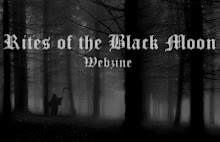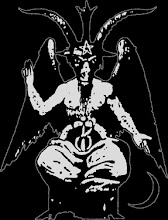Recorded in the murky depths of Saxony, Rehearsal 5 - Under the Cold Fullmoon was released in August 1995. As with most of Moonblood's rehearsal tapes, the majority of these songs do not exist anywhere else, meaning that this material exists only in this rare and harsh-sounding form. This is not one of the more impressive offerings from this band, as the songwriting is not consistent and includes ideas that would have been better unrecorded. Nevertheless, this demo contains some really good material, too, and is worth listening to.
There is no way to really know if it is a limitation of the source recording or if the sound quality seems low because of my copy possibly being a thirteenth generation dub. However, with no reference point to prove otherwise, it would seem that the sound is worse than the previous tapes. The volume drops, from time to time, and there are also times when one channel or the other disappears for a few seconds. Otherwise, one can still find the same raw and primitive soundscape that Moonblood is known for. The percussion is audible and just loud enough to contribute without interfering with the more important elements. Gaamalzagoth's vocals are rather high, as usual, spewing venom and hissing blasphemies. The guitars have a cold, yet distant, sound. One can almost get a sense of the melodies being emitted from a dark and unknown forest, obscured by fog and ancient trees.
As for the music, the material is not quite as strong as some of the other rehearsals. The title track is somewhat similar to the version that appears on Blut & Krieg, yet the atmosphere is different enough that this is certainly worth hearing. It feels a little less structured and more spontaneous, as if it was still a work in progress at the time. Some of the other songs feature more simplistic rhythms, being somewhat rock-based. These moments are contrasted with the full-on necro assault of blasting drums, fast-picked tremolo melodies and hateful vocals that make your skin crawl. "A Hiker in the Darkness" is a good example of a song that could have been stripped of the mid-paced parts in order to create something more intense and meaningful. It is not bad, but it comes off as rather disjointed, with the eerie and cold tremolo riffs having little or nothing in common with the rest. "Blood on the Moon" is similar, beginning with quite pedestrian ideas before transitioning to faster, hypnotic melodies. Unfortunately, the boring part returns and kills the enjoyment of this. This continues on throughout the recording. Good, solid riffs are paired with uninspired ideas, resulting in songs that fail to be completely enjoyable. When the listener is skipping ahead to get back to the good riff, the musician has failed as a songwriter. "A Good Day to Die" manages to avoid the problems that plague some of the other tracks, though it is not at the same level as some of their previous efforts. Nonetheless, by comparison, it sounds pretty good. "On Cold Wings" is one of the better songs on here, carried forward by frigid and woeful guitar melodies that possess a very sombre feeling. In some ways, the riffs sound like bitter cold winds, wailing through the limbs of bare trees in the middle of a dark winter night. The cover of Bathory's "Raise the Dead" is fairly true to the original, though still sounds a bit odd. This would be the first of many Quorthon compositions that Occulta Mors would record, over the years. "Night" wouldn't be so bad, if not for the oddly Middle Eastern-sounding intro/outro. That is terribly off-putting and hardly fits. "Sin is Here" salvages things, mixing slow doom riffs with the typical tremolo melodies and creating something really mournful and foreboding. This is the sort of epic brilliance that Moonblood is known for, something that was severely lacking with most of the material on this tape. With the closing song, the listener is drawn into pitch-black darkness of a world lost and forgotten, slowly eaten alive by the misery and pain of existing in this present age where all is wrong and contaminated. These riffs seep into your subconscious and take root, sure to remain for months or even years after the initial listen.
Under the Cold Fullmoon is somewhat of a disappointing collection of songs. One can find a couple good songs and some decent riffs all throughout, but the low points really drag the whole thing down. There is a feeling of experimentation present here, as Occulta Mors seemed to be trying out some different ideas within the established framework of Moonblood's sound. In this case, it did not succeed. If not for "On Cold Wings" and "Sin is Here", this rehearsal might have been doomed to remain in obscurity. However, at least for these two songs, it is still relevant and essential to seek out.
There is no way to really know if it is a limitation of the source recording or if the sound quality seems low because of my copy possibly being a thirteenth generation dub. However, with no reference point to prove otherwise, it would seem that the sound is worse than the previous tapes. The volume drops, from time to time, and there are also times when one channel or the other disappears for a few seconds. Otherwise, one can still find the same raw and primitive soundscape that Moonblood is known for. The percussion is audible and just loud enough to contribute without interfering with the more important elements. Gaamalzagoth's vocals are rather high, as usual, spewing venom and hissing blasphemies. The guitars have a cold, yet distant, sound. One can almost get a sense of the melodies being emitted from a dark and unknown forest, obscured by fog and ancient trees.
As for the music, the material is not quite as strong as some of the other rehearsals. The title track is somewhat similar to the version that appears on Blut & Krieg, yet the atmosphere is different enough that this is certainly worth hearing. It feels a little less structured and more spontaneous, as if it was still a work in progress at the time. Some of the other songs feature more simplistic rhythms, being somewhat rock-based. These moments are contrasted with the full-on necro assault of blasting drums, fast-picked tremolo melodies and hateful vocals that make your skin crawl. "A Hiker in the Darkness" is a good example of a song that could have been stripped of the mid-paced parts in order to create something more intense and meaningful. It is not bad, but it comes off as rather disjointed, with the eerie and cold tremolo riffs having little or nothing in common with the rest. "Blood on the Moon" is similar, beginning with quite pedestrian ideas before transitioning to faster, hypnotic melodies. Unfortunately, the boring part returns and kills the enjoyment of this. This continues on throughout the recording. Good, solid riffs are paired with uninspired ideas, resulting in songs that fail to be completely enjoyable. When the listener is skipping ahead to get back to the good riff, the musician has failed as a songwriter. "A Good Day to Die" manages to avoid the problems that plague some of the other tracks, though it is not at the same level as some of their previous efforts. Nonetheless, by comparison, it sounds pretty good. "On Cold Wings" is one of the better songs on here, carried forward by frigid and woeful guitar melodies that possess a very sombre feeling. In some ways, the riffs sound like bitter cold winds, wailing through the limbs of bare trees in the middle of a dark winter night. The cover of Bathory's "Raise the Dead" is fairly true to the original, though still sounds a bit odd. This would be the first of many Quorthon compositions that Occulta Mors would record, over the years. "Night" wouldn't be so bad, if not for the oddly Middle Eastern-sounding intro/outro. That is terribly off-putting and hardly fits. "Sin is Here" salvages things, mixing slow doom riffs with the typical tremolo melodies and creating something really mournful and foreboding. This is the sort of epic brilliance that Moonblood is known for, something that was severely lacking with most of the material on this tape. With the closing song, the listener is drawn into pitch-black darkness of a world lost and forgotten, slowly eaten alive by the misery and pain of existing in this present age where all is wrong and contaminated. These riffs seep into your subconscious and take root, sure to remain for months or even years after the initial listen.
Under the Cold Fullmoon is somewhat of a disappointing collection of songs. One can find a couple good songs and some decent riffs all throughout, but the low points really drag the whole thing down. There is a feeling of experimentation present here, as Occulta Mors seemed to be trying out some different ideas within the established framework of Moonblood's sound. In this case, it did not succeed. If not for "On Cold Wings" and "Sin is Here", this rehearsal might have been doomed to remain in obscurity. However, at least for these two songs, it is still relevant and essential to seek out.
.jpg)









